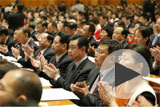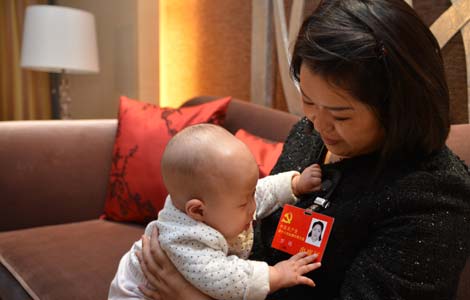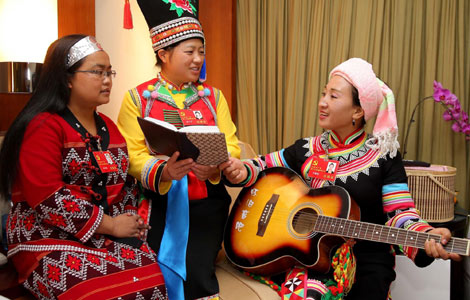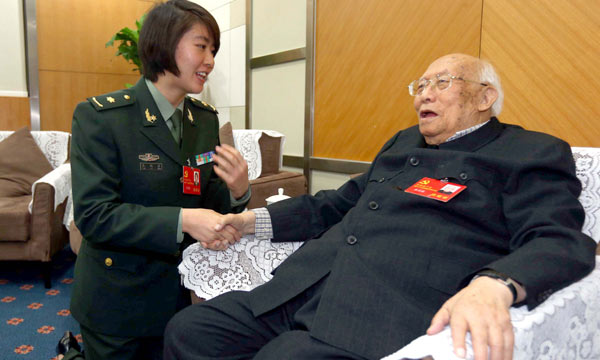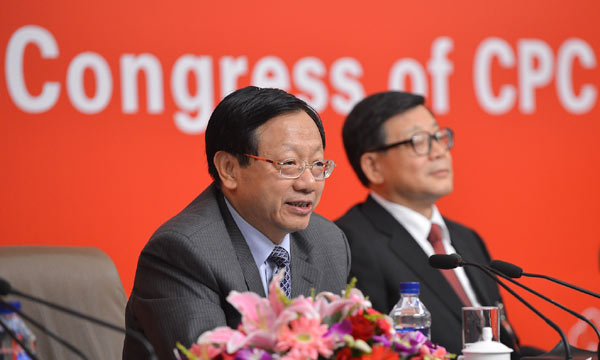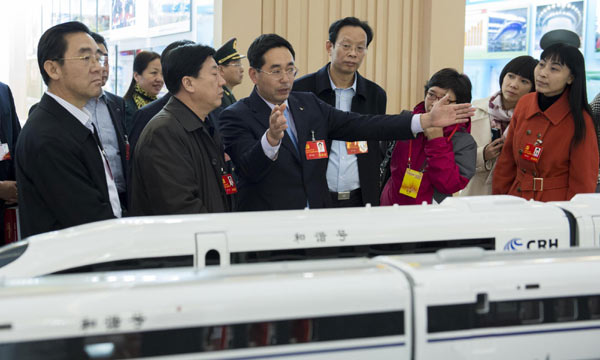Why does Mao Zedong choose Hua Guofeng as his successor?
By Zhang Ruoqiong (CPC Encyclopedia)
Updated: 2011-08-29 15:36
|
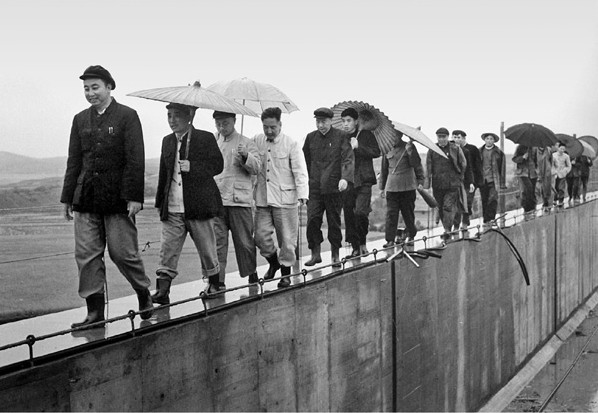 In 1965, Hua Guofeng checked the quality of project in Shaoshan in Hunan. |
Hua received not only a good evaluation from Mao, but from the Hunan Provincial Party Committee. "Hua Guofeng is an honest man. He is young and promising", Zhang Pinghua, the first secretary of Provincial Party Committee said.
The advantage of socialism is to let people live a rich life, Hua Guofeng believed, and he encouraged himself and people to be rich by working. In July 1964, he began to take charge of the government work at the secretary of Provincial Party Committee and was responsible for the issues on industry, transportation, financial and trade. In September, he was again elected as the deputy governor of Hunan province. Hua Guofeng was 43 years old and undertook the burden of provincial government work.
During the period of "Cultural Revolution" (1966-76), Hua Guofeng was criticized. He struggled and was asked to give a checkup, and even Hua himself didn't understand the revolution. However, when he was asked to speak to the media to show his attitude and gain the understanding and support from the masses, he refused. "I'm the responsible person and I should review my mistakes", Hua said.
At that time, the Central Committee called for the leading cadres to take part in the meeting in Beijing. Zhou Enlai, entrusted by Mao Zedong, was responsible for taking Hua Guofeng to Beijing. Mao planned to ask Hua to join in the leadership of Provincial Revolutionary Committee. In February 1971 Hua Guofeng attended the national planning working conference in Beijing."Chairman Mao nominates you to work in the State Council and assist Li Xiannian to do the work", Zhou Enlai conveyed Mao Zedong's message to Hua Guofeng. Then, Zhou announced this nomination at the conference.
Today people would not know Yuan Longping, who is famous as Father of Hybrid Rice, without Hua Guofeng's support. Hua had protected Yuan Longping from criticism during the "Cultural Revolution" and supported Yuan's distribution of hybrid rice on a large scale. Yuan was very touched and appreciative.
In 1971, Hua Guofeng was called to Wuhan and had a talk with Mao Zedong. Before this, Hua was ordered to inspect the agriculture production in various cities. He reported the situation about agriculture to Mao. "Your brains are filled with agriculture. That is not enough and you should also consider the route struggle", Mao said to Hua. "Besides industry and agriculture, something else like the Party, politics, military and people are also very important".
Mao wanted Hua to become a leader who could both compose and perform military exercises. Mao gave orders soon to let Hua hold a concurrent post of secretary at the Guangzhou military area.
During this long talk with Hua, Mao had also referred to Lin Biao, who was going to split the party, and criticized his serious mistake. After Hua's return to Beijing, he reported to Premier Zhou Enlai the minutes of talks, by which Zhou had learned of Chairman Mao’s attitude and intentions. From then on, Zhou began to trust and dependend on Hua.
In October 1971, under the approval of Mao Zedong, the CPC Central Committee decided to add Hua Guofeng as the member and deputy head of the business group of the State Council. On Aug 2, 1973, Hua Guofeng, Mao Zedong and Zhou Enlai were seated in the first row of the podium. At the First Plenary Session of the 10th CPC held on Aug 30, Hua was elected as the member of CPC Political Bureau.
On April 7, 1976, Mao Zedong proposed, as the CPC Political Bureau nominated, Hua Guofeng as the first vice-chairman and premier of the State Council. After Mao was terminally ill, on June 25, 1976, Hua undertook the heavy burden and struggled with the "Gang of Four".
After Mao's death, Hua became the top leader of the Party and government and made great efforts to solve the problem of the "Gang of Four". Soon after, members of the "Gang of Four"were arrested and the 10-year turmoil ended. After breaking up the "Gang of Four", Hua Guofeng took hosts of Chairman of the CPC Central Committee, Chairman of the CPC Central Military Commission and Premier of the State Council.
Deng Xiaoping spoke highly of Hua's effective solution of the "Gang of Four" and praised Hua for his competence.
When the overall situation was already decided, other Party leaders unanimously praised Hua Guofeng's credit and performance. "Hua saves the revolution and the Party at the critical period". "Hua has the talent to be a leader". "Chairman Mao is wise to choose Hua Guofeng as the successor".
In October 1976, Hua Guofeng invited Deng Xiaoping to come back to work.
From July 12 - 21, 1977, the Third Plenary Session of the 13th CPC was held. It was at this meeting that Hua Guofeng was subsequently confirmed as the Chairman of the CPC Central Committee and CPC Central Military Commission and Deng Xiaoping resumed the post of vice-chairman of the CPC Central Committee, vice-premier of the State Council and vice-chairman of the CPC Central Military Commission.
In 1980, Hua Guofeng requested to resign the post of chairman of the CPC Central Committee and CPC Central Military Commission at the age of 59. This act was the first in the Party's history.
Source: "History Reference", 15th issue, 2011.
Video
